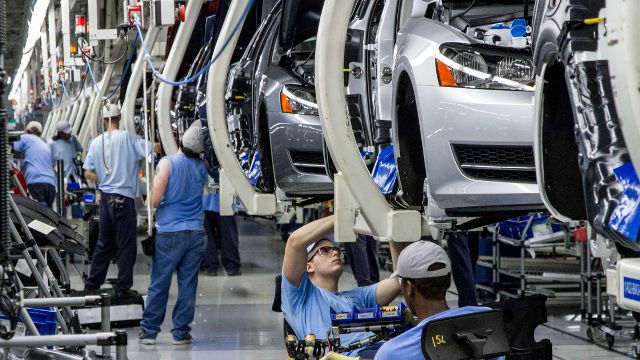
For years, economist Dean Baker has waged a lonely campaign urging progressives to stop accusing business-friendly politicians of being “free-market fundamentalists.” In his 2011 book, The End of Loser Liberalism: Making Markets Progressive, he wrote, “The vast majority of the right does not give a damn about free markets; it just wants to redistribute income upward.” Today, you don’t need to look any further than Tennessee for proof that the “free market” rhetoric of business-friendly politicians is in fact thin cover for favoring the investor class over workers and the environment.
In the Volunteer State, Volkswagen determined that it can gain a competitive advantage by establishing a workers’ council — a structure that gives employees a voice in a plant’s management — and remaining neutral in a vote on whether its workers will be represented by the United Auto Workers (UAW).
VW is basing its decisions on past experience. Workers councils are required by law in Germany, and they’ve proven good for both labor and management across Europe. Studies show that councils in union shops lead to both higher productivity and better wages. Engaged workers also take a longer view of their employer’s financial position — which in tough times makes them more likely to offer concessions to management.
All but three of VW’s 106 plants worldwide have workers’ councils — two of those without are in China, the other is the company’s plant in Chattanooga, Tennessee. Under US labor law, VW cannot form a workers’ council unless its factory is unionized.
If VW’s 1,500 Tennessee workers choose to be represented by the UAW during a three-day election process that began yesterday, the company would become the first foreign auto-manufacturer to have a union shop in the South, and its workers’ council might become a model for other companies to emulate.
That prospect has driven conservative Tennessee lawmakers up the wall. Rightwingers who profess a love for “limited government” are threatening legislative reprisals against Volkswagen’s workers should they opt for unionization. And not just its workers — according to the Detroit Free-Press, their campaign has become” as much a fight with Volkswagen management as with the UAW.”
State Sen. Bo Watson (R-Chattanooga) told the Free-Press, “Should the workers choose to be represented by the United Auto Workers, then I believe additional incentives for expansion will have a very tough time passing the Tennessee Senate.” State Rep. Craig Fitzhugh, a Democrat, responded, “In my 20 years… I’ve never seen such a massive intrusion into the affairs of a private company.”
Tennessee’s Republican Governor Bill Haslam was more circumspect but no less clear. His spokesman said, “Any discussions of incentives are part of additional and continued talks with VW, which we look forward to.” In other words, nice tax break you’ve got there, Volkswagen — it’d be a shame if something happened to it.
Sen. Bob Corker (R-TN) took a different approach, claiming that VW officials had secretly told him that “should the workers vote against the UAW, Volkswagen will announce in the coming weeks that it will manufacture its new mid-size SUV here in Chattanooga.” VW officials responded with a terse press release saying, “There is no connection between our Chattanooga employees’ decision about whether to be represented by a union and the decision about where to build” the SUV.
Bo Watson went so far as to call VW’s openness to a union vote “un-American.” Reached by email, Larry Mishel, president of the Economic Policy Institute, responded by asking, “Was Tennessee un-American in 1979, when nearly one in four workers there were union? It’s very American that Tennessee workers didn’t benefit much from productivity growth since 1979, but is that what we want America to be?”
Mishel noted that between 1979, when 24.6 percent of Tennessee’s workforce belonged to a union, and 2013, when that number had fallen to just over six percent, workers’ productivity increased 75.6 percent but median hourly wages only rose 12.5 percent.
Mishel added that these numbers are in keeping “with a larger phenomenon,” and independent research bears that out. A 2007 study by Lonnie Stevans of Hofstra Business School found that in states with “right-to-work” laws like Tennessee’s, there are more businesses, and business owners do better, but hourly wages and household income are both significantly lower.
Despite that, according to In These Times’ labor reporter Mike Elk, lawmakers’ threats to retaliate against VW, combined with a massive campaign by outside anti-union groups, may be working. Wayne Cliett, a VW worker who supports the UAW, told Elk that while his side had momentum, the anti-union campaign “is turning some [people] away that once were supporters.”
There’s a reason the anti-UAW campaign has been so nasty. Tennessee lawmakers are meddling with the freedom of contract of both Volkswagen and its workers because they see empowered working people as a threat to a system that makes business owners richer and their workers poorer. As Harold Meyerson wrote in The American Prospect:
The Republicans’ and the Right-to-Work Committee’s fears are understandable. For decades, the Southern economy has grown chiefly because it’s been a cheap-labor alternative to the Northeast, Midwest, and West Coast… If unions get a foothold in the South, Americans’ wages might just start leveling up instead of down. What’s more, if unions grow in the South — a region where the union share of the workforce is scarcely more than 5 percent — then the Southern states might see their political balance of power altered. Southern states might start enrolling their voluminous numbers of the poor in programs like Medicaid and passing minimum-wage statutes of their own.
A lot will be riding on this week’s vote.


